Analysis of Nation and Nationalism Concepts in Political Science
VerifiedAdded on 2022/08/18
|5
|964
|15
Essay
AI Summary
This essay provides a detailed analysis of the concepts of nation and nationalism, tracing their origins and evolution. It defines the terms, differentiating between nation and state, and explores the role of nationalism in the context of globalization and immigration. The essay examines the impact of nationalism on political ideologies, referencing historical events like the French Revolution and contemporary examples such as Brexit and Indian politics. It highlights the importance of understanding these concepts in the face of changing political scenarios, discussing citizenship rules and the challenges posed by nationalism's exclusive tendencies. The author uses references from various scholars to support the arguments and provides a comprehensive overview of the complexities of nation and nationalism.
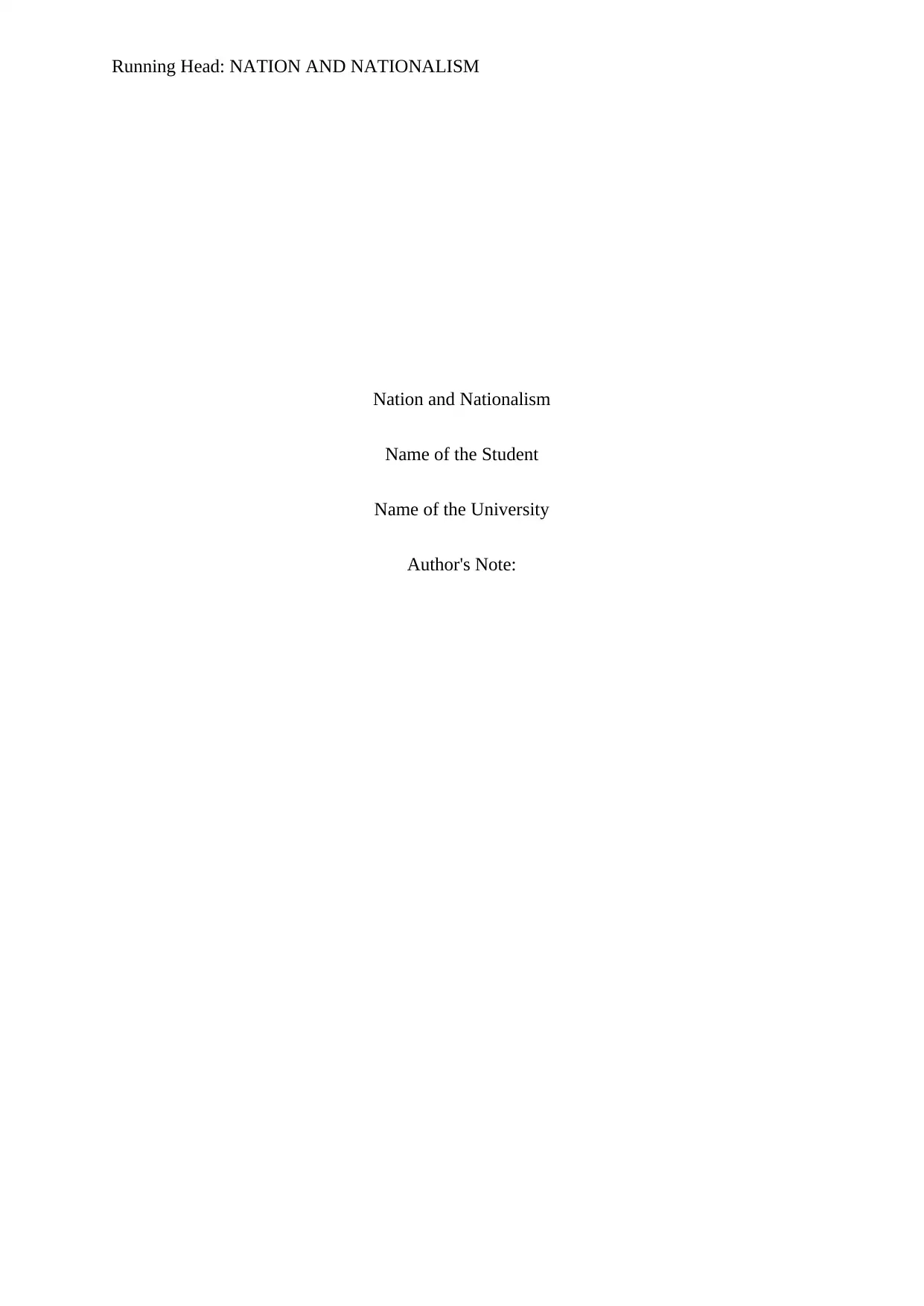
Running Head: NATION AND NATIONALISM
Nation and Nationalism
Name of the Student
Name of the University
Author's Note:
Nation and Nationalism
Name of the Student
Name of the University
Author's Note:
Paraphrase This Document
Need a fresh take? Get an instant paraphrase of this document with our AI Paraphraser
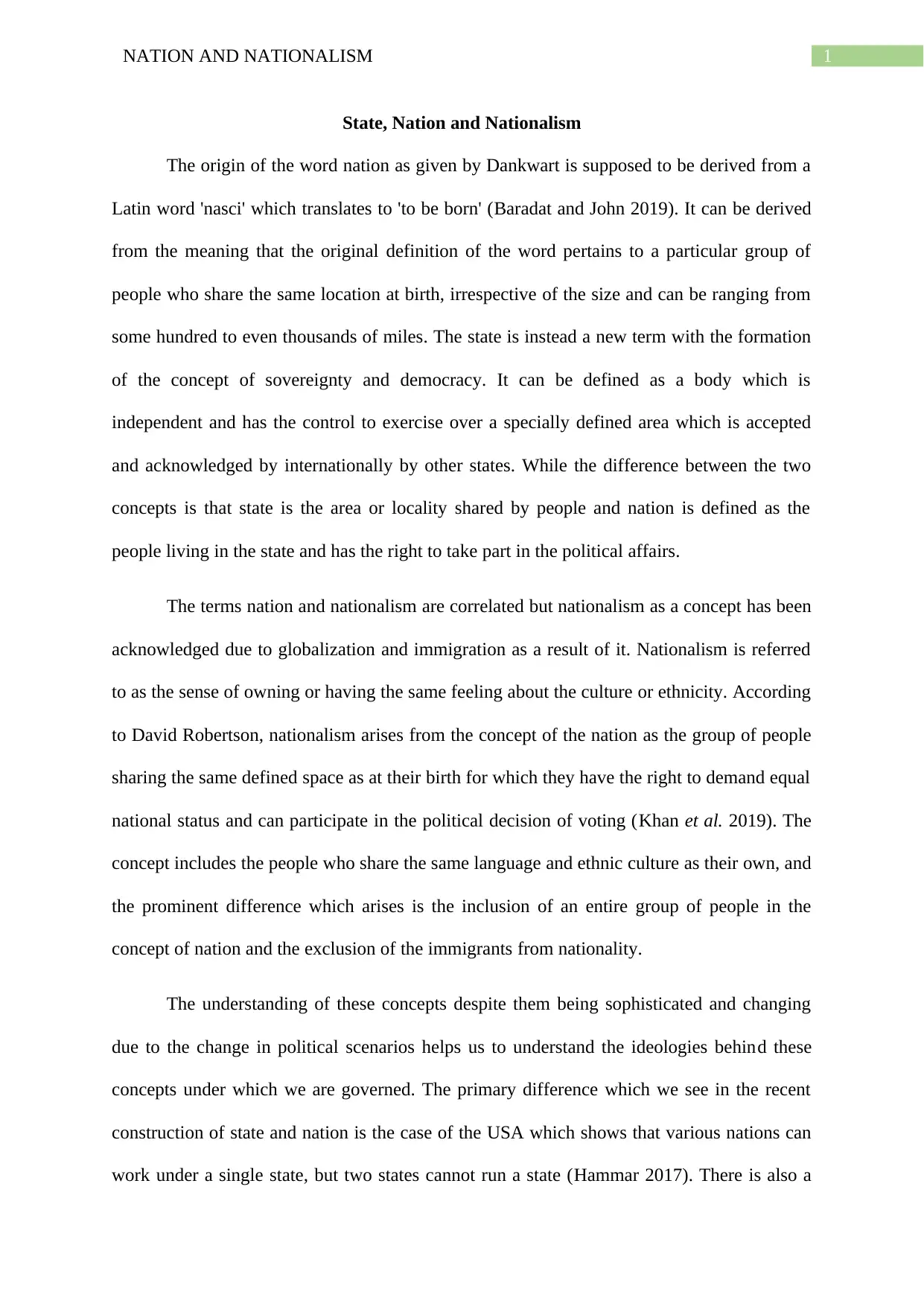
1NATION AND NATIONALISM
State, Nation and Nationalism
The origin of the word nation as given by Dankwart is supposed to be derived from a
Latin word 'nasci' which translates to 'to be born' (Baradat and John 2019). It can be derived
from the meaning that the original definition of the word pertains to a particular group of
people who share the same location at birth, irrespective of the size and can be ranging from
some hundred to even thousands of miles. The state is instead a new term with the formation
of the concept of sovereignty and democracy. It can be defined as a body which is
independent and has the control to exercise over a specially defined area which is accepted
and acknowledged by internationally by other states. While the difference between the two
concepts is that state is the area or locality shared by people and nation is defined as the
people living in the state and has the right to take part in the political affairs.
The terms nation and nationalism are correlated but nationalism as a concept has been
acknowledged due to globalization and immigration as a result of it. Nationalism is referred
to as the sense of owning or having the same feeling about the culture or ethnicity. According
to David Robertson, nationalism arises from the concept of the nation as the group of people
sharing the same defined space as at their birth for which they have the right to demand equal
national status and can participate in the political decision of voting (Khan et al. 2019). The
concept includes the people who share the same language and ethnic culture as their own, and
the prominent difference which arises is the inclusion of an entire group of people in the
concept of nation and the exclusion of the immigrants from nationality.
The understanding of these concepts despite them being sophisticated and changing
due to the change in political scenarios helps us to understand the ideologies behind these
concepts under which we are governed. The primary difference which we see in the recent
construction of state and nation is the case of the USA which shows that various nations can
work under a single state, but two states cannot run a state (Hammar 2017). There is also a
State, Nation and Nationalism
The origin of the word nation as given by Dankwart is supposed to be derived from a
Latin word 'nasci' which translates to 'to be born' (Baradat and John 2019). It can be derived
from the meaning that the original definition of the word pertains to a particular group of
people who share the same location at birth, irrespective of the size and can be ranging from
some hundred to even thousands of miles. The state is instead a new term with the formation
of the concept of sovereignty and democracy. It can be defined as a body which is
independent and has the control to exercise over a specially defined area which is accepted
and acknowledged by internationally by other states. While the difference between the two
concepts is that state is the area or locality shared by people and nation is defined as the
people living in the state and has the right to take part in the political affairs.
The terms nation and nationalism are correlated but nationalism as a concept has been
acknowledged due to globalization and immigration as a result of it. Nationalism is referred
to as the sense of owning or having the same feeling about the culture or ethnicity. According
to David Robertson, nationalism arises from the concept of the nation as the group of people
sharing the same defined space as at their birth for which they have the right to demand equal
national status and can participate in the political decision of voting (Khan et al. 2019). The
concept includes the people who share the same language and ethnic culture as their own, and
the prominent difference which arises is the inclusion of an entire group of people in the
concept of nation and the exclusion of the immigrants from nationality.
The understanding of these concepts despite them being sophisticated and changing
due to the change in political scenarios helps us to understand the ideologies behind these
concepts under which we are governed. The primary difference which we see in the recent
construction of state and nation is the case of the USA which shows that various nations can
work under a single state, but two states cannot run a state (Hammar 2017). There is also a
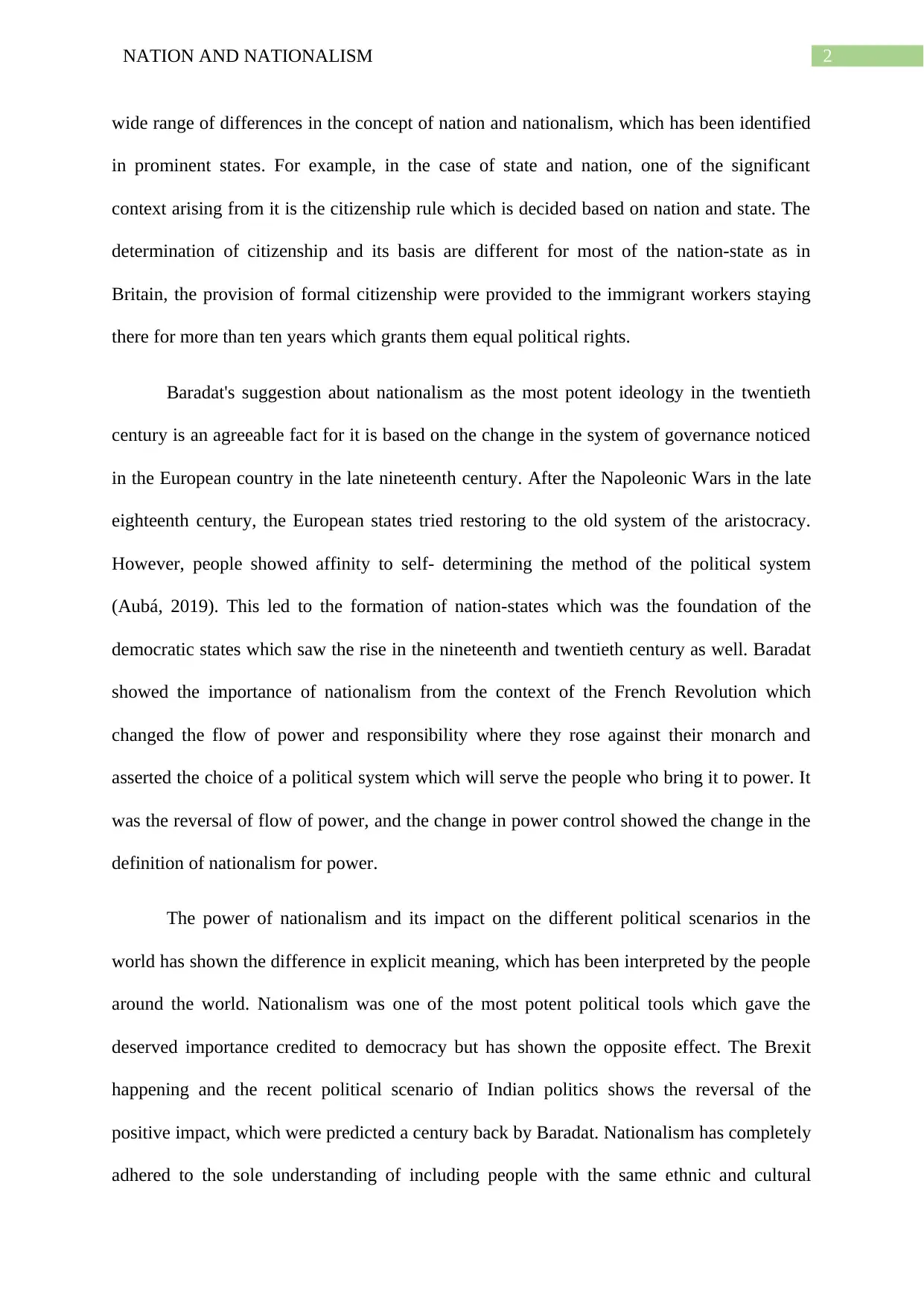
2NATION AND NATIONALISM
wide range of differences in the concept of nation and nationalism, which has been identified
in prominent states. For example, in the case of state and nation, one of the significant
context arising from it is the citizenship rule which is decided based on nation and state. The
determination of citizenship and its basis are different for most of the nation-state as in
Britain, the provision of formal citizenship were provided to the immigrant workers staying
there for more than ten years which grants them equal political rights.
Baradat's suggestion about nationalism as the most potent ideology in the twentieth
century is an agreeable fact for it is based on the change in the system of governance noticed
in the European country in the late nineteenth century. After the Napoleonic Wars in the late
eighteenth century, the European states tried restoring to the old system of the aristocracy.
However, people showed affinity to self- determining the method of the political system
(Aubá, 2019). This led to the formation of nation-states which was the foundation of the
democratic states which saw the rise in the nineteenth and twentieth century as well. Baradat
showed the importance of nationalism from the context of the French Revolution which
changed the flow of power and responsibility where they rose against their monarch and
asserted the choice of a political system which will serve the people who bring it to power. It
was the reversal of flow of power, and the change in power control showed the change in the
definition of nationalism for power.
The power of nationalism and its impact on the different political scenarios in the
world has shown the difference in explicit meaning, which has been interpreted by the people
around the world. Nationalism was one of the most potent political tools which gave the
deserved importance credited to democracy but has shown the opposite effect. The Brexit
happening and the recent political scenario of Indian politics shows the reversal of the
positive impact, which were predicted a century back by Baradat. Nationalism has completely
adhered to the sole understanding of including people with the same ethnic and cultural
wide range of differences in the concept of nation and nationalism, which has been identified
in prominent states. For example, in the case of state and nation, one of the significant
context arising from it is the citizenship rule which is decided based on nation and state. The
determination of citizenship and its basis are different for most of the nation-state as in
Britain, the provision of formal citizenship were provided to the immigrant workers staying
there for more than ten years which grants them equal political rights.
Baradat's suggestion about nationalism as the most potent ideology in the twentieth
century is an agreeable fact for it is based on the change in the system of governance noticed
in the European country in the late nineteenth century. After the Napoleonic Wars in the late
eighteenth century, the European states tried restoring to the old system of the aristocracy.
However, people showed affinity to self- determining the method of the political system
(Aubá, 2019). This led to the formation of nation-states which was the foundation of the
democratic states which saw the rise in the nineteenth and twentieth century as well. Baradat
showed the importance of nationalism from the context of the French Revolution which
changed the flow of power and responsibility where they rose against their monarch and
asserted the choice of a political system which will serve the people who bring it to power. It
was the reversal of flow of power, and the change in power control showed the change in the
definition of nationalism for power.
The power of nationalism and its impact on the different political scenarios in the
world has shown the difference in explicit meaning, which has been interpreted by the people
around the world. Nationalism was one of the most potent political tools which gave the
deserved importance credited to democracy but has shown the opposite effect. The Brexit
happening and the recent political scenario of Indian politics shows the reversal of the
positive impact, which were predicted a century back by Baradat. Nationalism has completely
adhered to the sole understanding of including people with the same ethnic and cultural
⊘ This is a preview!⊘
Do you want full access?
Subscribe today to unlock all pages.

Trusted by 1+ million students worldwide
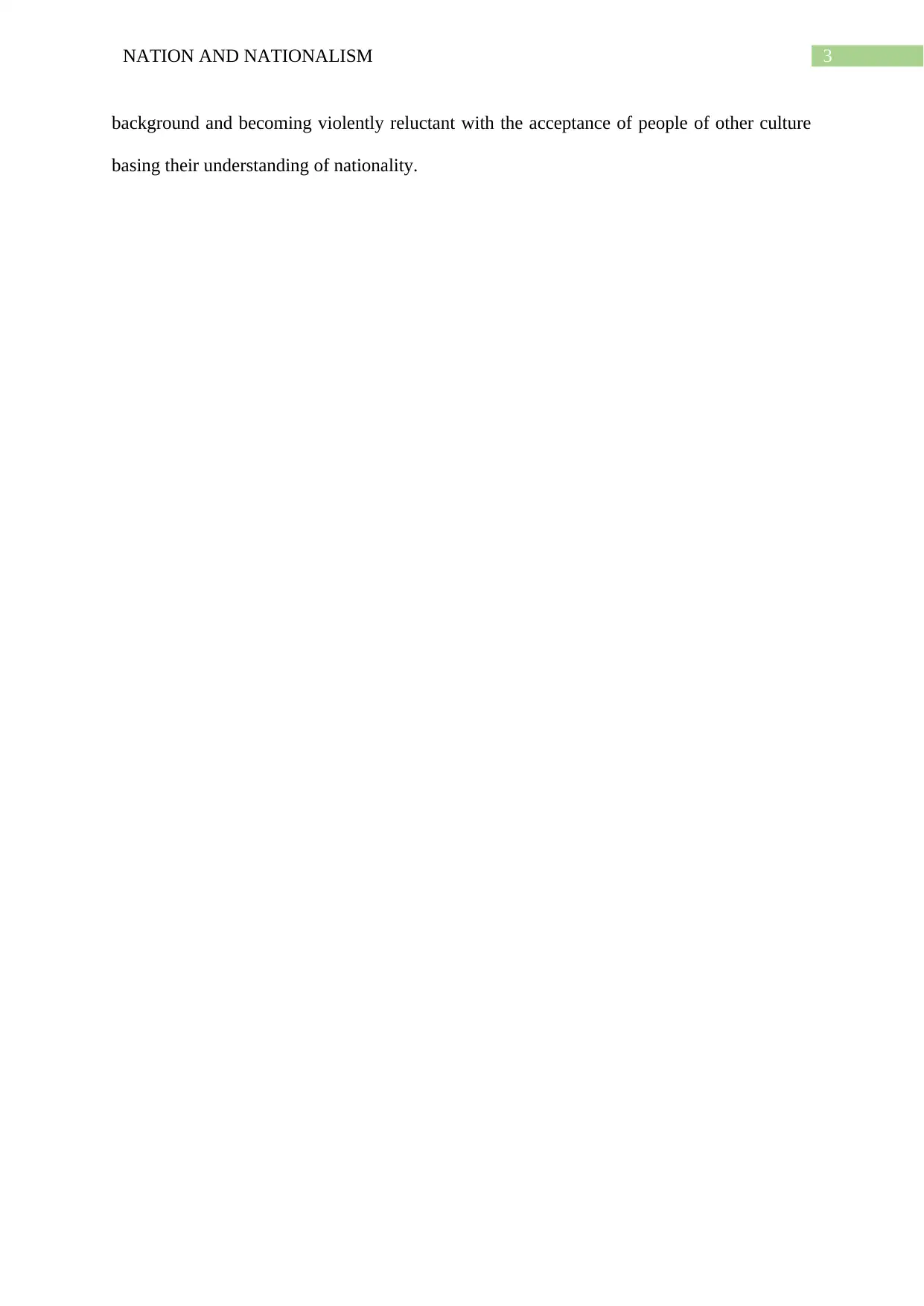
3NATION AND NATIONALISM
background and becoming violently reluctant with the acceptance of people of other culture
basing their understanding of nationality.
background and becoming violently reluctant with the acceptance of people of other culture
basing their understanding of nationality.
Paraphrase This Document
Need a fresh take? Get an instant paraphrase of this document with our AI Paraphraser
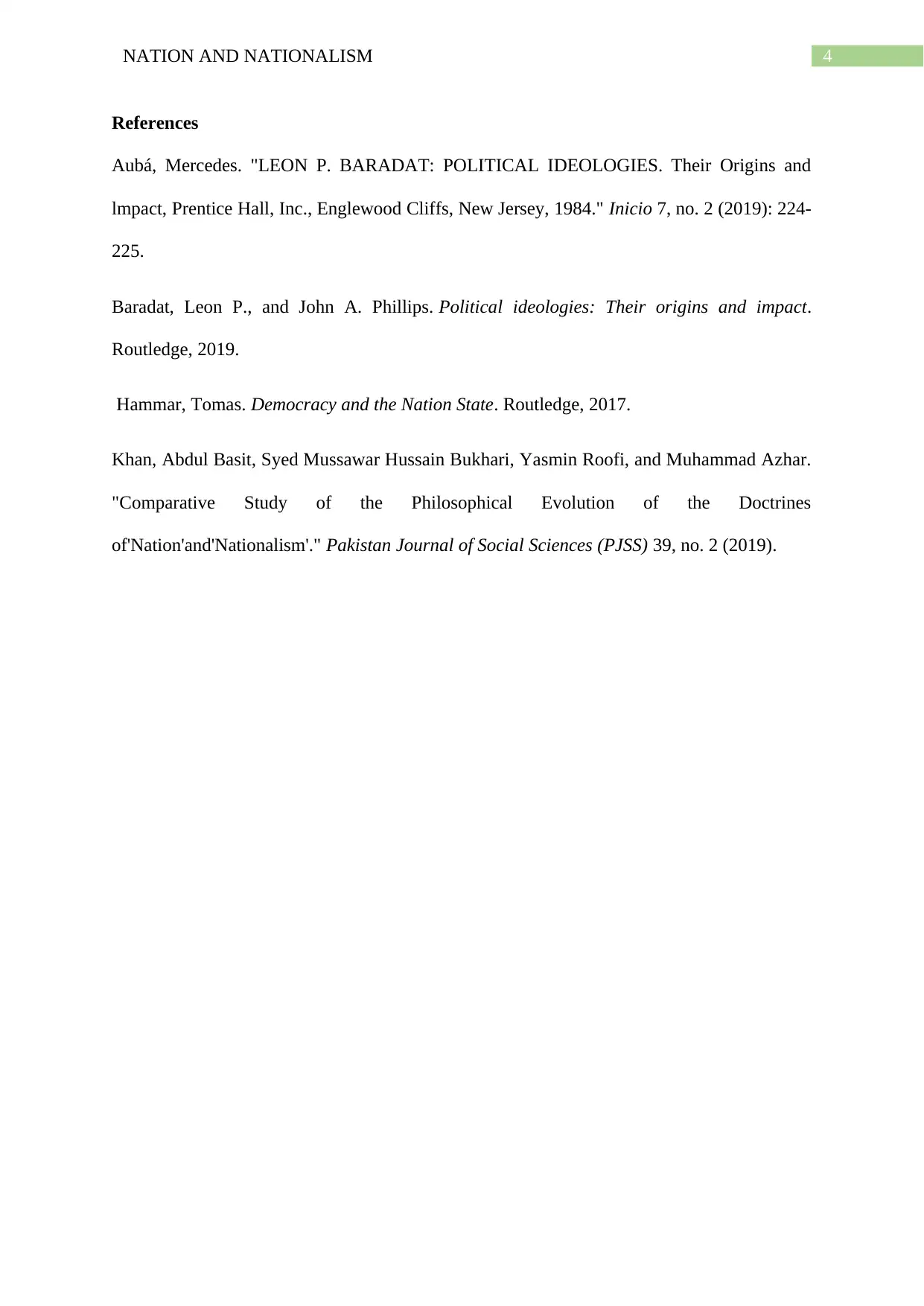
4NATION AND NATIONALISM
References
Aubá, Mercedes. "LEON P. BARADAT: POLITICAL IDEOLOGIES. Their Origins and
lmpact, Prentice Hall, Inc., Englewood Cliffs, New Jersey, 1984." Inicio 7, no. 2 (2019): 224-
225.
Baradat, Leon P., and John A. Phillips. Political ideologies: Their origins and impact.
Routledge, 2019.
Hammar, Tomas. Democracy and the Nation State. Routledge, 2017.
Khan, Abdul Basit, Syed Mussawar Hussain Bukhari, Yasmin Roofi, and Muhammad Azhar.
"Comparative Study of the Philosophical Evolution of the Doctrines
of'Nation'and'Nationalism'." Pakistan Journal of Social Sciences (PJSS) 39, no. 2 (2019).
References
Aubá, Mercedes. "LEON P. BARADAT: POLITICAL IDEOLOGIES. Their Origins and
lmpact, Prentice Hall, Inc., Englewood Cliffs, New Jersey, 1984." Inicio 7, no. 2 (2019): 224-
225.
Baradat, Leon P., and John A. Phillips. Political ideologies: Their origins and impact.
Routledge, 2019.
Hammar, Tomas. Democracy and the Nation State. Routledge, 2017.
Khan, Abdul Basit, Syed Mussawar Hussain Bukhari, Yasmin Roofi, and Muhammad Azhar.
"Comparative Study of the Philosophical Evolution of the Doctrines
of'Nation'and'Nationalism'." Pakistan Journal of Social Sciences (PJSS) 39, no. 2 (2019).
1 out of 5
Related Documents
Your All-in-One AI-Powered Toolkit for Academic Success.
+13062052269
info@desklib.com
Available 24*7 on WhatsApp / Email
![[object Object]](/_next/static/media/star-bottom.7253800d.svg)
Unlock your academic potential
Copyright © 2020–2026 A2Z Services. All Rights Reserved. Developed and managed by ZUCOL.



